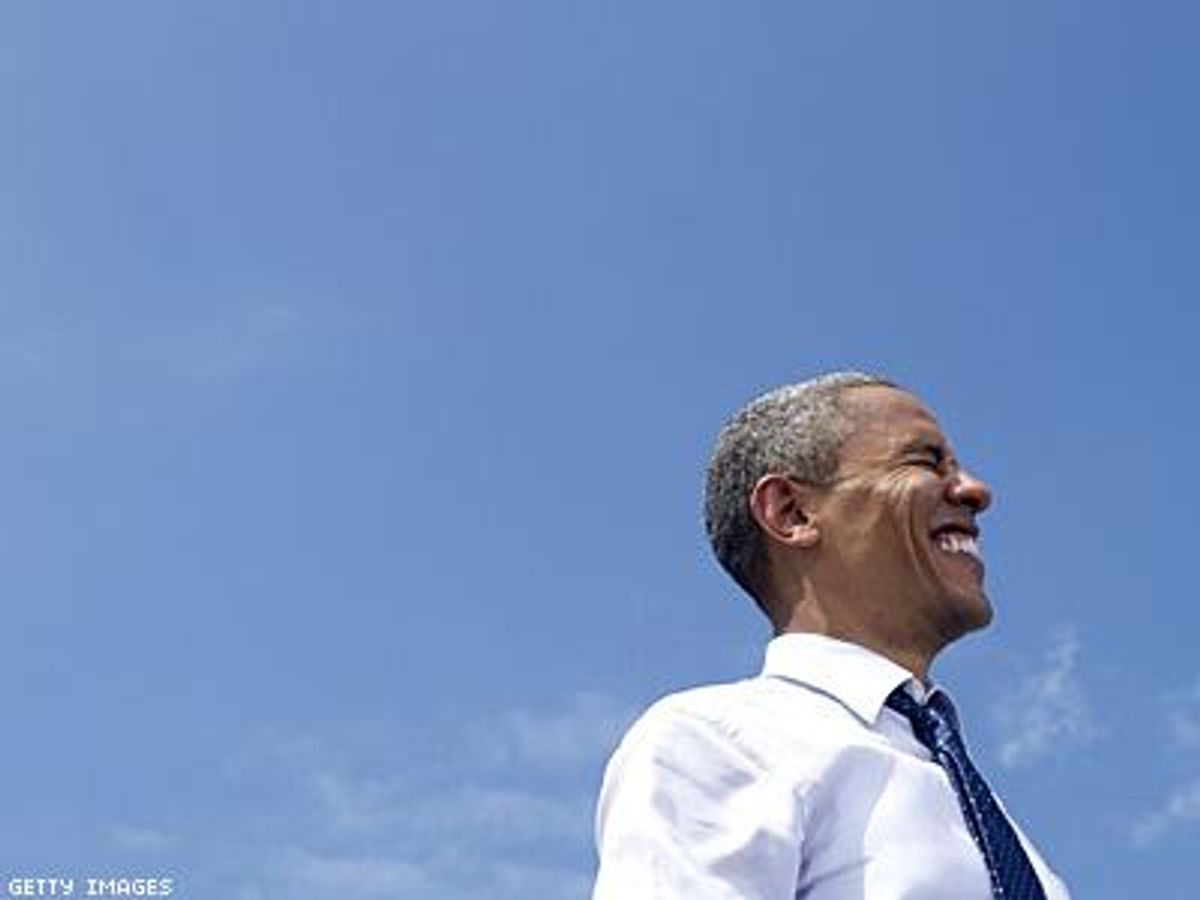Many say his loose-lipped vice president backed him into a corner, but when President Obama endorsed marriage equality a few days after Joe Biden did in May 2012, it was the first ripple in a tidal wave of presidential LGBT rights declarations. At his inauguration, Obama cited the Stonewall riots along with historic demonstrations for the rights of women and racial minorities in Seneca Falls, N.Y., and Selma, Ala. America, he said, isn't really free until its gay citizens are: "For if we are truly created equal, then surely the love we commit to one another must be equal as well."
Obama upped the ante in February when his administration filed an amicus curiae, or friend of the court, brief in the pending Supreme Court case involving California's Proposition 8. In the other marriage equality case before the court, involving the Defense of Marriage Act, the administration has refused to defend the discriminatory law and filed several briefs saying why it should be struck down (these are not amicus briefs, as the U.S. government is a party to the case). The president, via the Department of Justice, declared that Prop. 8 and DOMA need to go.
Obama's marriage equality endorsements robbed the anti-equality movement of one of its major talking points -- even the president doesn't support same-sex marriage; our position is no different from that of the leader of the free world -- and, in last year's election, likely influenced Maryland, Maine, and Washington State voters to affirm marriage equality and the Minnesota electorate to reject a proposed constitutional amendment banning gay marriage. But are Obama's positions swaying the GOP establishment as well?
When it came to suggesting the Supreme Court strike down Prop. 8, the Obama administration was beaten to the punch by a group of Republicans. More than 100 prominent party members, including New York congressman Richard Hanna and Stephen Hadley, a national security adviser to George W. Bush, filed an amicus brief shortly before the administration did, telling the high court that same-sex couples have a constitutional right to marry. The Respect for Marriage Coalition even ran a pricey ad campaign featuring well-known Republicans -- Colin Powell, Dick Cheney, Laura Bush -- using news sound bites of each supporting marriage equality.
"When couples are committed to each other and love each other, then they ought to have, I think, the same sort of rights that everyone has," Bush says in the ad. (But she didn't like her remarks being used without her permission, and she asked that they be removed. The ads ceased two days later.)
"With this recent group of Republicans, I wouldn't say it was Barack Obama; it was Mitt Romney [that swayed them]," says Gregory Angelo, Log Cabin Republicans' executive director. "It was the crushing defeat of 2012. Voters did not appreciate the Republican messaging on marriage equality." Now Republicans are concerned with winning the next election and some believe digging in their heels on this issue will not help.
"This is just getting the Republican Party in line with the preponderance of the nation that supports marriage rights and equal rights for same-sex couples," Angelo says.
But there is no clear consensus among the party that supporting same-sex marriage will lead to more votes -- the Republican National Committee just reaffirmed their opposition to same-sex marriage at a meeting last week in Los Angeles. Even if some equality-minded Republicans were partly influenced by the president, loyal party members would never admit that. Regardless, former Republican National Committee chairman Ken Mehlman, who managed George W. Bush's reelection campaign in 2004, came out in 2010, and now supports marriage equality, believes it's neither Obama nor Romney changing the GOP.
"I think that most of the signers of the brief, like other Americans who have increasingly embraced the freedom to marry, are most impacted by what they see in their own lives," Mehlman says. "That's how change so often occurs -- people reflecting on their core values and also their experiences. And as people consider the importance of marriage to their own lives, they recognize how fundamental this right is. As they come to fully know their gay friends and relatives and neighbors and teammates, they don't think it's fair or consistent with conservative values to deny them this basic right."
This point rings true with Ohio's Republican senator Rob Portman, who announced last month he now supports same-sex marriage, saying his son's coming out helped him see the light. It's less clear who or what influenced Mark Kirk, the Republican senator from Illinois who came out for marriage equality this month, though it sounds like his mortality had something to do with it. "Our time on this earth is limited, I know that better than most," Kirk, who suffered a stroke last year, said in a statement on his blog. "Life comes down to who you love and who loves you back -- government has no place in the middle."



















































































Viral post saying Republicans 'have two daddies now' has MAGA hot and bothered